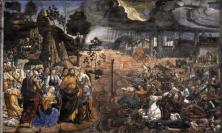Our celebration of the Year of Faith continues with a study of those characters in the Old Testament who might be considered to be ‘models of faith’. Contained within these narratives of personal relationships with God are valuable lessons that can shape our own responses to God and to the gift of faith. But, as Nicholas King SJ warns us, ‘Old Testament faith is no easy matter.’
We have been invited by the Pope to make this a ‘Year of Faith’, as a preparation for refreshing our work of spreading the gospel. It seems good, therefore, to take a look at what the Old Testament has to tell us about faith. It may be as well to face two common misunderstandings at the outset.
The first of these frequent errors is the notion that ‘faith’ is a matter of believing lots of impossible propositions, a series of sentences that the Church has drawn up to separate the wheat from the chaff, or the men from the boys, so that if you can tick all the boxes then you fit the mould of ‘Catholic’. That is not what the Bible understands by ‘faith’, however. A better model is that of a relationship, joyfully proclaimed, though sometimes uncomfortable to live, with the Loving Mystery, the Creator of the universe, to whom we give the deceptively simple name of ‘God’.
The second regular misapprehension is that the God of the Old Testament is an angry and violent deity, whom no rational being could possibly worship. Those who maintain this error have not troubled to sit down and read through the Old Testament (admittedly it is a bit long, and in places far from easy reading).
A further difficulty is that there is no Old Testament word for ‘faith’. The nearest word for it comes from the Hebrew root ’aman, which gives us the word ‘Amen’, meaning something like ‘trustworthy’ or ‘reliable’, and which produces a noun ’emeth, meaning ‘firmness’ or ‘constancy’ or ‘faithfulness’ or ‘truth’, and a host of other meanings that belong in that area. That is what to look for in people who have this quality that the New Testament will call ‘faith’.
Old Testament models of faith
So it seems that the best way of looking at ‘faith’ in what we call the ‘Old Testament’ (though Jewish friends make the challenging point that it is neither a testament nor old), might be to examine the behaviour of those who are thought to have faith; we shall take just three instances.
1. Abraham
The prime example of such a one is the figure of Abraham, who in Genesis 12:1-3, and at the age of 75, no less, is abruptly told by God, ‘Go from your land and from your relatives, and from your father’s house, to the land that I shall show you’. Then the text goes into poetry, as the Lord continues,
‘And I shall make you into a great nation, and I shall bless you,
I shall make your name great, and it shall be a blessing.
I shall bless those who bless you
And curse those who curse you,
And all the clans of the earth shall be blessed because of you’.
We are then dumbfounded as the narrator continues, ‘and Abram went, as YHWH had spoken to him’. There follows a series of adventures, some edifying, some less so, which you will do well to read in Genesis 12-24, and watch what it means to be an archetypal ‘person of faith’. For Abram (or Abraham, as he later becomes) now undergoes a series of rather alarming tests, which he more or less passes. However, he still, three chapters later, has no offspring, and in chapter 15 he raises the matter with God. God’s response is ‘“look, please, at the heavens, and count the stars, if you can count them.” And he said to him, “So shall your offspring be”.’ Then we hear Abram’s response, of which St Paul will later make a good deal: ‘And he put his trust in YHWH, and he reckoned it to him as an act of righteousness’. The point here is that, against all the odds, Abraham, as he will be finally named in Genesis 17:5, has a sufficiently profound relationship with God to trust what he has been told. We are invited to read and reflect, and then imitate.
The climax of Abraham’s faith journey comes in Genesis 22, the most chilling story in the entire Bible. Here he is a good deal more than a hundred years old (for Isaac has grown up, and his father was a centenarian when he was conceived), and to our bafflement God tells him (22:2), ‘Take, please, your son, your beloved, whom you love, Isaac, and go [this is the same Hebrew command as God used when he set off on his journey back in chapter 12] to the land of Moriah, and offer him there as a sacrifice’. We watch in pain and incomprehension as Abraham obeys blindly; we listen to Isaac’s innocent question, ‘where is the sheep for the sacrifice?’ Abraham replies, and our fears are not one whit allayed, ‘God will look to it, my son’. With supreme artistry, the narrator places the neutral line, ‘and the two of them walked on together’ on either side of this frightening dialogue, and the very neutrality of it adds to the emotional content of the story. Now it turns out that Abraham was right to believe that God ‘will look to it’, and Isaac’s life is spared; but his faith was exercised at a price. The attentive reader will notice that Sarah, the boy’s mother, is not mentioned in the whole story (indeed the very next thing that she does is to die – 23:2), while Isaac never speaks to his father again. Old Testament faith is no easy matter.
2. David
Then there is David, a complex and ambiguous figure, about whom some robust stories are told between 1 Samuel 16 and 1 Kings 2 (you could do worse than read through these stories, if you want to see how faith works out in this extraordinary man’s life). His faith emerges in what he does, and in what happens to him. For example, when Saul’s servants are trying to persuade their king to make use of David’s musical gifts to heal Saul, they claim that ‘the Lord is with him’ (1 Samuel 16:18). We hear it on his own lips, as he asks Saul for the privilege of taking on Goliath in single combat: ‘the Lord, who delivered me from the power of the lion and the bear, will deliver me also from the power of this Philistine’; indeed, this fact of the Lord’s presence to David becomes the grounds for Saul’s hatred of him (1 Samuel 18:28-29).
God, normally named as ‘YHWH’ in these tales, is always there in the background, and David takes it as a matter of course that he should consult God before going out on campaign (23:4; cf 2 Samuel 2:1; 5:19, 23). It is a part of David’s piety that he will not slay the ‘Lord’s Anointed’ when he has the opportunity (24:7; 26:9-11, 23-24; cf 2 Samuel 1:14), and that he sees the gift of Abigail as God’s doing (25:32). When David’s camp is raided by Amalekites, and all the wives and children are captured, the narrator reports that ‘David proved himself strong in the Lord’, which is sometimes translated as ‘with renewed trust in the Lord’ (30:6). Moreover, when some of David’s troops are reluctant to distribute their spoils with those who did not go out to battle with them against the Amalekites, it is to generosity that he appeals in overruling them (30:23 - ‘what the Lord has given us’). At the same time he is also aware that the Lord represents a rather alarming power, and so, after the frightening death of Uzziah, the Ark of the Covenant is not brought into the City of David, but to the house of Obed-Edom the Hittite (2 Samuel 6:10); when he reverses this decision, David leaps and dances before the Lord as the Ark is after all brought into his city, to the undisguised contempt of his wife (6:14-22).
David also has to be corrected by God, however, once he has become king: the first occasion is when David had the bright idea of building a Temple for his deity, just like any other minor Near Eastern potentate, and has to be given a lesson on the meaning of ‘God’s House’, and, for that matter, of the ‘house of David’ (7:1-28). The second occasion is that of his disgraceful behaviour with Bathsheba, the wife of Uriah the Hittite, when David had failed to do what kings are supposed to do and lead his army out on campaign. Instead he stays at home and commits adultery and murder, until the prophet Nathan is sent to speak to him (11:1-12-25), and David, quite unlike another minor Near Eastern potentate, is heard to say, ‘I have sinned with regard to YHWH’ (12:13). The third occasion is when, once again just like a megalomaniac ruler, he holds a census of Israel and Judah, against Joab’s advice and in arrogance against the Lord (2 Samuel 24:1-17); his repentance is once more an example to us all.
And it becomes more complex still, for after Absalom’s rebellion, in which David was certainly not without fault, David does not permit the Ark of the Covenant to come with him, and makes this expression of faith: ‘return the Ark of God to the City; if I find favour in the eyes of YHWH, he will bring me back, and will make me see it and its dwelling-place. And if he says “I am not pleased with you”, I am ready: let him do with me as it is good in his eyes’.(2 Samuel 15:25-26). It does not matter here whether David actually said these words. The point, so far as we are concerned, is the model of faith that this complex character puts before us: that he accepts, in advance and unconditionally, whatever God will do to him.
Finally the Court Historian brings the story of David (almost) to an end by placing a wonderful hymn of gratitude on David’s lips, to the God who has guided him all the way (though it delicately overlooks the sins that he has committed). When 2 Kings begins, David is almost at death’s door, and we have simply the intrigues by Bathsheba and Nathan to make sure that Solomon gets onto the throne. David’s final speech to his wife contains an oath by God: ‘as the Lord lives, who has rescued me from all trouble’ (1 Kings 1:29). Finally, in chapter 2, David is given a long speech, reminding Solomon above all that, ‘you are to keep the commands of YHWH your God, to walk in his ways, and to keep his ordinances and decrees’. What we are invited to do is to take the whole life of this eminently human king and see how his faith in God informs every moment of his existence, even when he goes so spectacularly wrong. After that we can try to live as he did, always in the presence of God.
3. The Psalmist
Then there are the Psalms. I have headed this section, conventionally enough, ‘the Psalmist’, but there is no such person. Or, rather, there are too many. It used to be conventional to ascribe all the psalms to David: in the Deuteronomic History there is a suggestion that he was good at playing the harp (1 Samuel 16:16-18 &c), and many of the psalms have headings suggesting that David wrote them; but that some of those psalms simply cannot have been written as early as David’s life-time does not matter. The Book of Psalms has been organised carefully to present us with Israel’s faith, expressed in the songs of many different times; and if you want to know what the community gathered round the Temple, and the community that later survived the destruction of Solomon’s Temple, thought about their God, then listen thoughtfully and reflectively to these songs.
It may help you to know that the most common verb in the Psalms is ‘sing’, often in the imperative mood; and that has two implications. First of all, the singing is directed ‘upwards’, so to say, to Israel’s God; but, secondly, singing is also ‘sideways’, a community activity, something that all Israel does together. The songs come in many different kinds, and scholars have named many categories of psalm: there are laments, on the lips of an individual or the entire community; there are songs of thanksgiving or confidence (perhaps the loveliest and best-known of these is Psalm 23, ‘The Lord is my Shepherd’), which often function as parts of the individual or community laments. Then there are hymns, or ‘psalms of praise’, songs of Zion, songs of God’s kingship, and ‘royal psalms’, which reflect on the relationship between God and the king, who represents the entire nation of Israel. There are ‘Wisdom psalms’ (a good example would be 119, the longest psalm of all), and ‘historical psalms’, which sing of how God has acted in Israel’s history, such as Psalm 106. There are many other kinds; but I hope that I have said enough here to encourage you to read them, and not switch off next time you are in church and the lector tells you ‘The response to the psalm is “Will ye no come back again?”’, or something like that. You will find in this collection of hymns something for your every mood, even anger against God: ‘How long, O Lord, how long?’ the poet sometimes angrily asks, just as the Book of Job does. (Job is another interesting model of Old Testament faith, but we have no space here to consider him. Read the book, instead).
Hineni: the daring response of Old Testament Faith
Finally, in this consideration of ‘Faith in the Old Testament’ as a background for our living out of the Year of Faith, I want to draw your attention to a single Hebrew word. It is hineni, which means, literally, ‘here I am’ or ‘behold, it’s me’. Sometimes it gets translated as ‘Ready!’; and, as that translation suggests, it is found on the lips of our models of Old Testament faith. You and I are therefore encouraged to have it on our lips when the call comes from the God of our faith. Most of the times when it is used in the Old Testament, I have to say, it is on God’s lips, often with more than a hint of menace: ‘look what I am about to do to the Amalekites’. Just occasionally, however, it is on the lips of human beings. The first time is in Genesis 22, which we looked at earlier, the story of Abraham agreeing to offer Isaac in sacrifice. Abraham says ‘hineni’ three times in the course of the story: first when God calls him (22:1); second, poignantly, when Isaac addresses him to ask where is the lamb for sacrifice (22:7 – and check how it is done into English in your favourite version); and thirdly, when the angel of the Lord addresses him from heaven (22:11) to stop him committing the murder.
So we might need to pause and reflect before saying ‘hineni’, but still go on to do it. The next time we hear it on human lips is when Jacob sends Joseph to go and visit his brothers (Genesis 37:13), who are looking after their father’s flocks in Shechem, and Joseph (who has enormously irritated his brothers by his dreams) is expressing his readiness to go and visit them. The upshot, of course, is that they kidnap him, but (thanks to the interventions of Reuben and Judah) do not kill him, and he ends up in Egypt, eventually to be reunited with them and with his father. But this happy ending comes only after God has led him through many adventures; and the next time a human utters the word is at Genesis 46:2, when God speaks to poor old Jacob, to encourage him to go down to Egypt and be reunited with Joseph.
The next time we hear the word, it is on the lips of Moses (Exodus 3:4), who, at this stage of his existence is a murderer on the run. He is looking after his father-in-law’s sheep, the burning bush addresses him and Moses responds, ‘hineni’. It is possible that he later came to regret this utterance of faith, for it is the start of his dangerous and demanding vocation to be the liberator appointed by God for Israel. There is not space here to go through all the unpleasant adventures, including accusations of genocide from the very people that he had liberated, but you will not waste your time if you read through from this point in the Book of Exodus to the death of Moses, far away in Deuteronomy 34:5. You may find yourself shifting nervously as you read, but be encouraged, for, in the end, there is no other way to go.
Samuel is the next human being to speak the word: he three times interrupts old Eli’s sleep, by saying to him, ‘hineni’, under the pardonable supposition that the priest had summoned him (1 Samuel 3:4, 6-8). Eli tells him that the next time, he is to say, ‘Speak, YHWH, for your servant is listening’. That is a phrase that should be on our lips, though we need to reflect on the lifetime of exigent service which Samuel now starts, involving him in difficult and demanding politics at the very highest level, even beyond the grave (see the compelling tale of the witch of Endor, and especially 1 Samuel 28:15). So that must be our response in faith; but it will not be an easy ride.
The next person to say ‘hineni’ in response to God’s invitation is King David himself (2 Samuel 15:26), indicating that he is ready to accept whatever punishment God may see fit to inflict, after Absalom’s rebellion. In that sense he is a model for us.
So also is the prophet Isaiah, the last person we shall look at who is unwise enough to say ‘hineni’. We find this in chapter 6 of Isaiah, the account of his original vision in the Temple ‘in the year when King Uzziah died’, when he has a vision of the presence of God and hears the seraphim (‘burning ones’) crying ‘Holy, holy, holy’ to each other. This brings him to the realisation that he is above his pay-grade, and he cries, ‘Woe is me – for I am lost, for I am a man of unclean lips’ (6:5); but this does not last long, for one of the ‘burning ones’ brings a burning coal and touches his lips with it. At that point, he hears God asking (6:8), ‘whom shall I send, and who will go for us?’, in response to which the prophet bounces up and down like an excited schoolboy and our hearts warm to him as he exclaims, ‘Hineni – send me!’. So starts the long and painful adventure of his career as a prophet.
So we should, in this Year of Faith, be cautious before saying ‘hineni’; nevertheless, if we are to make sense of our lives, that is what we are to do. Once you have heard the Lord’s invitation, ‘hineni’ is the only possible response. But, you have been warned, it will be a rough ride.
Conclusion: the fidelity of God
However, if that were the whole truth, what on earth would be the point? For the fact is that what the Old Testament teaches us is that faith is not something that we can do for ourselves, but, as the old Penny Catechism taught us, is ‘a gift of God’. What grounds the faith to which we are invited is nothing other than the undying, unconditional fidelity of God, for whose ‘steadfast love’ the word ’emeth, with which we started, was designed. It is God who is faithful, and therefore who evokes faith in us. This is what is in play at Exodus 19:5, when God tells Moses that, ‘if you really listen to my voice, and keep my covenant, you shall be my personal possession, among all the peoples’. Israel’s role (and therefore our role) is to remember what God has done, and this of course is what happens at the Passover Seder (see Exodus 13:3-16) and at the covenant renewal ceremony, when Israel declares before God, in beautifully alliterative Hebrew, ‘a wandering Aramean was my father’ (Deuteronomy 26:5). That is what Israel’s hymn-book sought to do, to remind God’s people of what God had done (and of the inevitably asymmetric relationship between YHWH and the community of Israel). For that, in the end, is what faith is in the Old Testament, and what we are invited to deepen in the course of this year: it is a relationship between God and the community that gathers round its God. That relationship is what makes Israel what it is; that relationship is what gives the Church its unique identity.
Nicholas King SJ is a tutor in Biblical Studies at Campion Hall, University of Oxford.
More articles for the Year of Faith:
![]() ‘Thinking Faith’ by Damian Howard SJ
‘Thinking Faith’ by Damian Howard SJ
![]() ‘Faith in the Gospels’ by Peter Edmonds SJ
‘Faith in the Gospels’ by Peter Edmonds SJ
![]() ‘A Contemplative Space:
‘A Contemplative Space:
Pondering God’s mystery across faiths ’ by Michael Barnes SJ
![]() ‘Faithful imagination’ by Rob Marsh SJ
‘Faithful imagination’ by Rob Marsh SJ






